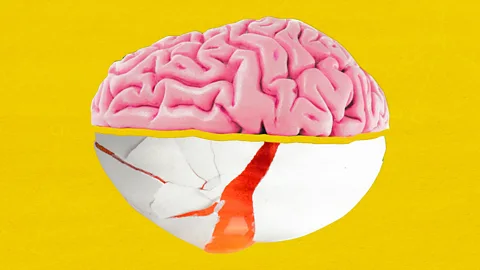Choline: The underappreciated nutrient that's vital for our brains
 Getty Images/ Serenity Strull/ BBC
Getty Images/ Serenity Strull/ BBCThe compound has been linked to improved cognitive performance and reduced anxiety – but are you getting enough of it?
You may not have heard of choline before, but studies show that it's crucial for our health, at various stages of life.
Choline is neither a vitamin or a mineral – it's an organic compound that's vital to the healthy functioning of the human nervous system. Now there's emerging evidence that consuming more choline can have a wide range of powerful effects, from improving cognitive performance to protecting against neurodevelopmental disorders, including attention-deficit/hyperactivity disorder (ADHD) and dyslexia.
The nutrient also seems to play a significant role in human neurodevelopment. In one study, babies who whose mothers took choline supplements during pregnancy gave birth to infants with higher information processing speeds – a measure of healthy cognitive functioning.
Scientists say that choline is a wonder-nutrient, but that it has been hugely overlooked. So, where does choline come from – and are you getting enough of it?
A crucial nutrient
Every cell in our body contains choline, says Xinyin Jiang, professor of health and nutrition sciences at Brooklyn College in New York, US.
Choline is an "essential" nutrient, which means we need it for our health, but our bodies don't produce enough on their own. Instead, we need to get some of it from our diets. In this sense, it's similar to omega 3 fatty acids, although it's actually closely associated with B vitamins, says Emma Derbyshire, science writer and founder and CEO of the consultancy Nutritional Insight.
More like this:
Choline can be found mostly in animal-based foods, including beef, eggs, fish, chicken and milk, but it's also in peanuts, kidney beans, mushrooms and cruciferous vegetables such as broccoli – although animal foods tend to contain more choline than plant-based sources.
We need choline for numerous functions in our bodies, including liver function. Not having enough can cause a number of problems.
"Choline helps fat transport out of the liver, and when a person is deficient, they can get a fatty liver," says Jiang.
 Getty Images
Getty ImagesCholine also helps the body to synthesise phospholipids, which are the main component of the cell membranes in our bodies. Being deficient in the nutrient can affect the expression of genes involved in the process of our cells multiplying. During the development of a foetus, choline deficiency can be particularly harmful because it inhibits cell proliferation in the brain.
Choline's role in the brain is crucial – in fact it's primarily a "brain nutrient", says Derbyshire. It's needed for our bodies to produce the neurotransmitter acetylcholine, which is a chemical that carries messages from your brain to your body through nerve cells. Acetylcholine plays a major role in brain nerve cells, which are needed for our memory, thinking and learning.
In one study involving almost 1,400 people aged 36 to 83, researchers found that people with a higher choline intake tended to have better memories, and that choline intake during midlife may help to protect our brains. Choline is commonly included as an ingredient in supplements taken as "nootropics" – a diverse group of substances which some people believe can enhance learning and memory.
On the other hand, choline deficiency has also been associated with neurodegenerative disorders such as Alzheimer's and Parkinson's disease.
Another way choline may affect the brain is our mental health. One study found that higher intake of choline was associated with lower levels of anxiety. In another study, having a higher dietary intake of choline was linked to a lower risk of depression.
Having an adequate choline intake can also come with a number of other benefits. A higher dietary intake of this nutrient .
Separately, research in mice has found that choline can help to lower the levels of homocysteine, an amino acid which can increase the risk of heart disease. High levels of homocysteine can also be linked to osteoporosis, and research has found that people with higher choline intakes from their diets tend to have a higher bone density – an indicator of strong, healthy bones with a lower risk of being fractured.
"Choline can potentially have an effect against bone loss," says Øyen Jannike, a researcher at the Institute of Marine Research in Norway, who has studied the link between choline and bone health.
This may partly be because of homocysteine, she says, but also because choline is an essential structure in our cell membranes.
The first 1000 days
It's well established that a child's first two years are critical for their development, and that the mother's diet during pregnancy and breastfeeding has an integral influence on this.
Studies show that choline is vitally important for a baby's development in the womb. In fact, babies are born with three times as much choline as their mothers, which Derbyshire says shows how important it is at this stage of life.
 Getty Images
Getty ImagesSeveral studies have found that the supply of choline in the womb correlates to the cognitive outcome of the baby, and its benefits may continue for years as the child develops. In one study, pregnant women who had the highest dietary choline intake during the second trimester of pregnancy (from week 13 to week 28) went on to have children who scored higher on a test of short- and long-term memory at the age of seven.
Some research even suggests insufficient choline intake when a woman is pregnant could be linked ADHD behaviours in their offspring.
Are we getting enough choline?
In Europe, the European Food Safety Authority (EFSA) has set recommendations for choline intake: 400mg for adults, and 480mg and 520mg for pregnant and breastfeeding individuals, respectively.
In the US, the Institute of Medicine (IOM) first established adequate choline intake recommendations in 1998: 550mg per day for men and 425mg per day for women, or 450mg during pregnancy and 550mg while breastfeeding.
An egg has around 150mg of choline, while a chicken breast has around 72mg, and a handful of peanuts has around 24mg.
In 2017, the American Media Association (AMA) also advised that prenatal vitamin supplements should contain "evidence-based" amounts of choline.
"We're seeing a lot more ADHD and dyslexia in schools, and some is genetic, but it's also possible that, in utero, they're not getting key nutrients," Derbyshire says. "These very subtle neurodevelopment changes are occurring and impacting them later on. We're treating the aftermath now."
Jiang has studied the relationship between the supply of choline during pregnancy and breastfeeding, and brain development. "In animal findings, when the mum has more choline, the cognitive development of their offspring is better," she says. "We're starting to find similar results in human studies, although, not exactly the same."
Feeding the brain
A 2020 review of 38 animal and 16 human studies concluded that choline supplementation helps brain development. However, only animal studies currently show a strong link between choline and improved cognitive function. The paper doesn't define the ideal amount of supplementation, but says most human studies use supplements providing up to 930mg choline daily – an amount equivalent to the choline in roughly six chicken's eggs – with no adverse effects reported.
There may also be some people that require more choline than the recommended daily amounts, says Øyen – including post-menopausal women, for example, who have lower levels of oestrogen, and people with fatty liver disease.
We also know, Derbyshire says, that, due to the genetic differences from one person to another, some people may have higher requirements for choline. (Derbyshire has previously consulted for and advised The Meat Advisory Panel, Marlow Foods (Quorn), the Health Supplement Information Service and the British Egg Information Service, among other organisations).
 Getty Images
Getty ImagesWhen we eat foods containing choline, it's very easily absorbed into our blood, says Jiang, which should go some way to ensuring we're consuming enough choline.
However, several studies show that many of us aren't getting enough. One study found that only 11% of American adults consume the recommended daily amount.
Eggs are one of the most potent dietary sources of choline, and there is some concern that those who choose to follow a vegan diet may not be getting enough of this nutrient – though there are many plant-based sources and choline supplements are widely available in developed countries.
One study found that people who eat eggs have almost twice the usual choline intake compared with those who don't, leading the researchers to conclude that consuming the daily adequate amount of choline was "extremely difficult" without eating eggs or taking a supplement.
But the EFSA's recommendation of 400mg of choline per day is achievable for most people if you plan your diet carefully, says Jiang. Some vegan sources of choline include tofu (28mg of choline per 100g), peanut butter (61-66mg per 100g) and soy beans (120mg per 100g).
Anyone concerned they're not getting enough choline can take a daily supplement, Øyen says. In the meantime, she adds, there needs to be more animal and human research to better understand the mechanisms behind some of choline's health benefits.
However "clinicians are becoming more aware of [choline]", says Derbyshire. While it often seems to be slightly overlooked, she is hopeful that choline will soon start to enjoy the limelight.
--
For trusted insights into better health and wellbeing rooted in science, sign up to the Health Fix newsletter, while The Essential List delivers a handpicked selection of features and insights.
